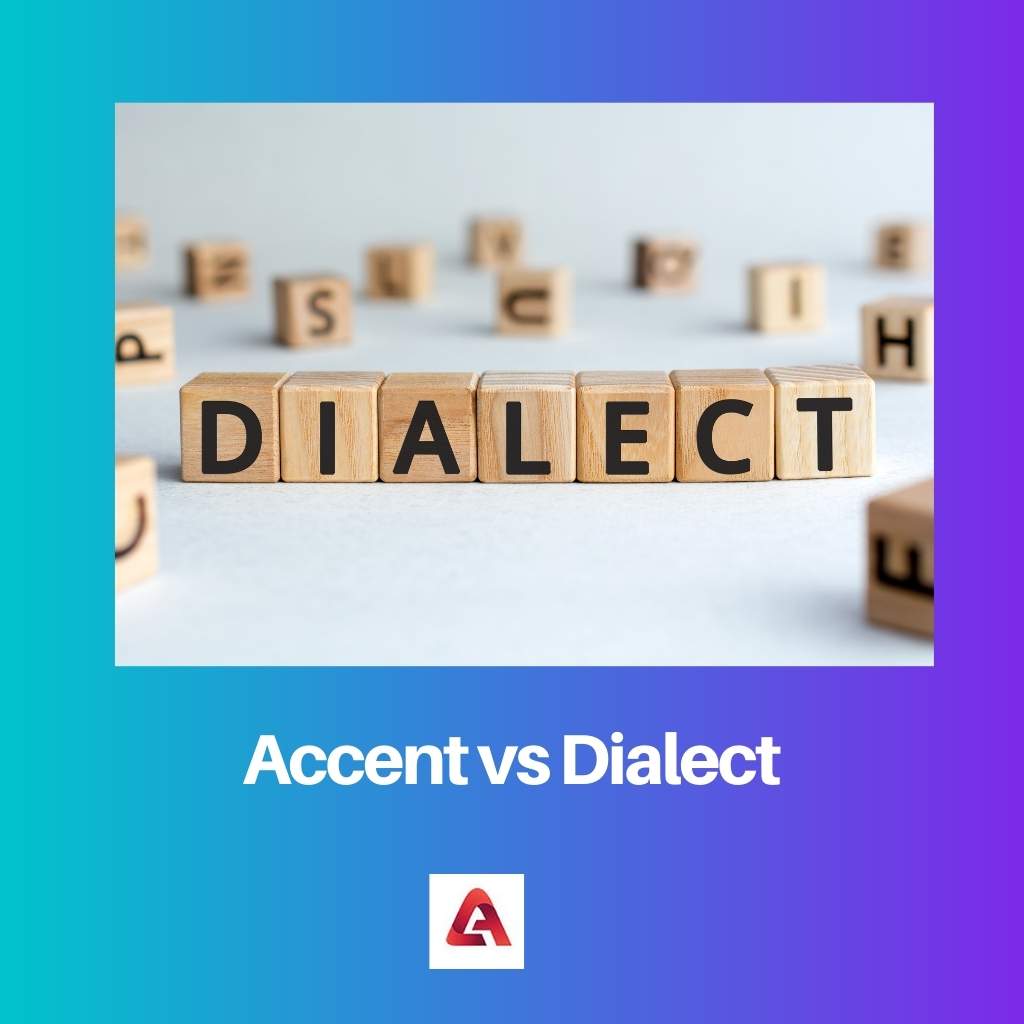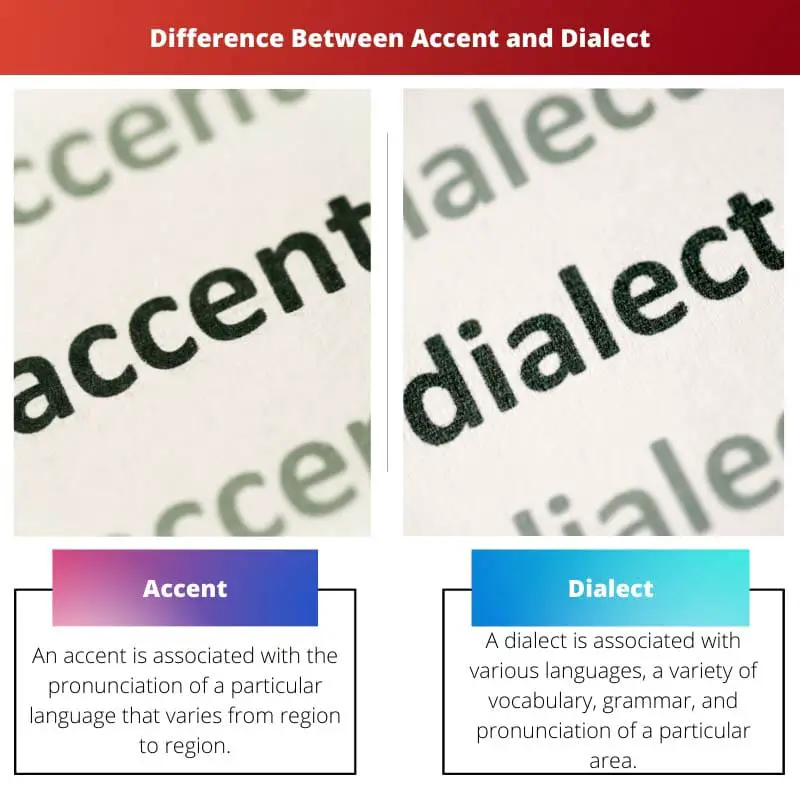We have heard people from various geographical regions speak the same language in different tones and pronunciations. Well, accent refers to the pronunciation of the same words in a different way which varies from region to region.
People with different dialects pronounce differently and use a specific set of vocabulary, grammar, and syntax.
Key Takeaways
- Accent refers to how words are pronounced, while dialect refers to a particular group of people’s unique vocabulary, grammar, and syntax.
- Accents can indicate a person’s regional or national origin, while dialect can indicate their cultural background.
- An accent is a subset of dialect.
Accent vs Dialect
Accents are influenced by geography, cultural background, and exposure to different languages. Dialects are a set of linguistic features that distinguish one group of speakers from another, due to migration, isolation, or exposure to other languages, refers to broader differences in vocabulary, grammar, and syntax.

People from different geographical areas and social communities can be spotted based on accents. An accent is a particular way of pronunciation of a language, the amount of stress given in vowels and consonants, etc.
For example, a person’s accent from the UK is easily distinguishable from one from North America.
Dialect refers to a variety of languages but in a particular geographical area. It deals with the variety of vocabulary, pronunciation, and other morphology and phonology of languages. We can say that accent is a part of dialect but not the other way around.
Comparison Table
| Parameters of Comparison | Accent | Dialect |
|---|---|---|
| Definition | An accent is associated with the pronunciation of a particular language that varies from region to region. | A dialect is associated with various languages, a variety of vocabulary, grammar, and pronunciation of a particular area. |
| Order | An accent is part of a dialect. | Dialect is part of a language but not a part of an accent. |
| Geography | Accent means the change in pronunciation associated with a particular language across various parts of the world. | Dialect refers to the variety of languages along with their morphology in a specific geographical area. |
| Pronunciation | Accent mainly focuses on the variation in the pronunciation of a language. | Dialect focuses on multiple languages’ pronunciation, vocabulary, grammar, and syntax. |
| Classification | There are two types of accents. One is a foreign accent, and the other is how one speaks their native language. | There are standard and non-standard dialects. The former is approved by several institutions, while the latter isn’t. |
What is Accent?
An accent is a way of speaking a certain language that differs with the geographical area and the community where one is raised. When one grows up listening to people talk in a certain way, they inculcate the same tone and pronunciation.
This is why a person from North America can easily differentiate his accent from a person who is raised in India.
Accents are mainly of two types. One is a foreign accent, and the second one is a native accent. A native accent is a way in which you speak your mother tongue or the most common language in that geographical area.
You might develop a foreign accent over time when residing in a different region or when learning a foreign language.
Accent mainly deals with the phonological aspect of a language, and it is part of a dialect. As it focuses mainly on pronunciation, some people might find it difficult to learn a foreign language because some sounds don’t exist in their native language.
For example, a German faces difficulty learning English because certain pronunciations in English don’t exist in the German language. In this scenario, the person tries to find the closest sound to that word.
What is Dialect?
A dialect of one language can be distinguished from another dialect of the same language based on morphology and vocabulary.
While accent only focuses on pronunciation, dialect comprises every aspect of a language and how it differs geographically (in most cases). A person can also have a different dialect based on his/her occupational and social background.
Unlike accent, which focuses on a single language and the way it is pronounced across the world, dialect refers to a variety of languages along with their morphology in a particular geographical boundary.
Noticing the variation in grammar and vocabulary is very important if one wants to understand the difference between dialects.
For example, the English language is spoken by people of various nationalities. But, in American English, what we know as “subway” is known as “underground” in British English.
But, both these words refer to the same structure or building with similarities. Another example is the word “corn” which refers to the same thing as “oats” (used in Scotland) and “maize” (used in the US and Canada).
Since dialect refers to the variation that is constricted within the same geographical boundaries, sometimes common words can be found in two different languages within the same region.
One can also find the language of a neighboring region very similar. This is due to geographical isolation, such that these two languages were dialects of the same language but eventually became two different languages due to geographical isolation.
Main Differences Between Accent and Dialect
- An accent is associated with the pronunciation of a particular language that varies from region to region, whereas a dialect is associated with various languages, a variety of vocabulary, grammar, and pronunciation of a particular area.
- An accent is part of a dialect, but it is not true the other way around.
- Accent means the change in pronunciation associated with a particular language across various parts of the world, whereas dialect refers to the variety of languages along with their morphology in a region.
- Accent mainly focuses on the variation in the pronunciation of a language, whereas dialect comprises of both the morphology and vocabulary of the language.
- There are two types of accents, namely, foreign accents and native accents. On the other hand, there are standard and non-standard dialects. The former is approved by several institutions, while the latter isn’t.

- https://www.tandfonline.com/doi/pdf/10.1080/00437956.1958.11659660
- https://onlinelibrary.wiley.com/doi/abs/10.1002/9781405166256.ch7

The detailed exploration of accent and dialect in this article is commendable. The comparative analysis and clear definitions provide an invaluable resource for anyone interested in linguistics.
Illuminating article. Thank you for shedding light on the subtle differences between accent and dialect, including the parameters of comparison. Very insightful.
Indeed, the comparison table was particularly enlightening. It’s fascinating to delve into the nuances of language and how it varies across regions.
This article is an intellectually stimulating exposition on accent and dialect. The clarity and precision with which the concepts are explained make it incredibly informative.
I appreciate the meticulousness with which the article delves into the main differences between accent and dialect. The illustrative examples effectively drive home the salient distinctions.
The attention to detail and scholarly approach to the topic are truly admirable. The article presents an intellectually enriching analysis while effectively promoting linguistic understanding.
An exceptional elucidation of the subtleties between accent and dialect. The conceptual clarity provided is remarkable. I was especially struck by the section on ‘What is Accent?’
This is a comprehensive and meticulously researched analysis of accent and dialect. The depth of understanding and meticulous approach to the topic are commendable.
The intricate characteristics that differentiate accent and dialect are elucidated with remarkable clarity in this article. It’s a testament to the author’s erudition and proficiency in linguistics.
The article effectively delineates the distinction between accent and dialect. The examples provided further elucidate the differences, making it an engaging read.